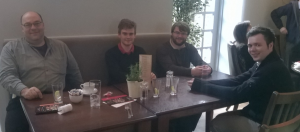Abstract:
Shape-changing interfaces physically mutate their visual display surface to better represent on-screen content, provide an additional information channel, and facilitate tangible interaction with digital content. The HCI community has recently shown increasing interest in this area, with their physical dynamicity fundamentally changing how we think about displays. This talk will describe our current work supporting the design and prototyping of shape-changing displays: understanding shape-changing application areas through public engagement brainstorming, characterising fundamental touch input actions, creating tools to support design, and demonstrating example implementations. It will end with a look at future challenges and directions for research.
Bio:
Jason is a lecturer in the School of Computing and Communications at Lancaster University. His primary research area is Human-Computer Interaction, with a particular interest in bridging the physical-digital divide using novel physical interaction devices and techniques. He was previously a post-doctoral researcher in the Bristol Interaction and Graphics (BIG) group at the University of Bristol. Before that he was a Ph.D. student in the HCI and Multimedia Lab at the University of Canterbury, New Zealand. More information can be found at http://www.scc.lancs.ac.uk/~jason/
This seminar is part of our ongoing series from researchers in HCI. See here for our current schedule.
Event details
- When: 11th November 2014 14:00 - 15:00
- Where: Cole 1.33a
- Format: Seminar


